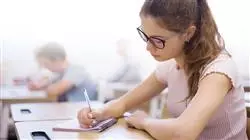University certificate
The world's largest faculty of education”
Introduction to the Program
This Professional master’s degree in Teaching Language and Literature in High School will generate a sense of confidence in the performance of your profession, which will help you to grow personally and professionally”

One of the main objectives of this Professional master’s degree is to prepare students to teach in multicultural groups where many languages are spoken. For all these reasons, different methodological approaches are presented to facilitate the teacher's work and the creation of activities within this specific framework. Interaction is essential to minimize the multicultural impact and enable the transition of the classroom from a teaching space to a social space.
Finally, we will emphasize the relevance of information and communication technologies in the field of teaching. The presence of ICT in the classroom brings wide-ranging benefits and helps in the presentation of content. Once again, the work of the teacher is a fundamental factor in its use, since they must create a digital resource database that is reliable and oriented to teaching in High School Education.
In conclusion, the Professional Master’s Degree in Teaching Language and Literature in High School is focused on the development of skills in linguistics, comprehension and oral and written production. The development of a teaching plan and its corresponding units must be geared towards achieving a series of objectives also established at the beginning of the school year. The relevance of teacher training for teaching Spanish as a foreign language (SFL) and the practical application of these fundamentals in a multicultural group which has limited contact with the Spanish language, is a priority in this program, as the educator is often faced with this situation nowadays. Finally, we present the benefits of using your own digital resource database that is practical and reliable in terms of its contents.
This program helps professionals in this field to increase their ability to succeed, which results in better practice and performance that will have a direct impact on educational outcomes, on the improvement of the educational system and on the social benefit for the whole community.
Update your knowledge through the Professional master’s degree in Teaching Language and Literature in High School"
This Professional master’s degree in Teaching Language and Literature in High School contains the most complete and up-to-date program on the market. The most important features include:
- More than 75 case studies presented by experts in Teaching Language and Literature in High School
- The graphic, schematic, and practical contents with which they are created provide scientific and practical information on the disciplines that are essential for professional practice
- Latest information on Teaching Language and Literature in High School
- Practical exercises where the self-evaluation process can be carried out to improve learning
- With special emphasis on innovative methodologies in Teaching Language and Literature in High School
- All of this will be complemented by theoretical lessons, questions to the expert, debate forums on controversial topics, and individual reflection assignments
- Content that is accessible from any fixed or portable device with an Internet connection
This Professional master’s degree is the best investment you can make when selecting a refresher program for two reasons: In addition to updating your knowledge in Teaching Language and Literature in High School, you will obtain a qualification from TECH Global University"
It includes in its teaching staff professionals belonging to the field of Teaching Language and Literature in High School, who contribute the experience of their work to this program, in addition to recognized specialists belonging to reference societies and prestigious universities.
The multimedia content, developed with the latest educational technology, will provide the professional with situated and contextual learning, i.e., a simulated environment that will provide immersive learning programmed to train in real situations.
This program is designed around Problem-Based Learning, whereby the teacher must try to solve the different professional practice situations that arise during the course. To do so, they will have the help of an innovative interactive video system created by leading experts in the field of Teaching Language and Literature in High School with extensive teaching experience.
Increase your decision-making confidence by updating your knowledge through this Professional master’s degree"

Make the most of the opportunity to learn about the latest advances in Teaching Language and Literature in High School and improve the education of your students"
Why study at TECH?
TECH is the world’s largest online university. With an impressive catalog of more than 14,000 university programs available in 11 languages, it is positioned as a leader in employability, with a 99% job placement rate. In addition, it relies on an enormous faculty of more than 6,000 professors of the highest international renown.

Study at the world's largest online university and guarantee your professional success. The future starts at TECH”
The world’s best online university according to FORBES
The prestigious Forbes magazine, specialized in business and finance, has highlighted TECH as “the world's best online university” This is what they have recently stated in an article in their digital edition in which they echo the success story of this institution, “thanks to the academic offer it provides, the selection of its teaching staff, and an innovative learning method aimed at educating the professionals of the future”
A revolutionary study method, a cutting-edge faculty and a practical focus: the key to TECH's success.
The most complete study plans on the university scene
TECH offers the most complete study plans on the university scene, with syllabuses that cover fundamental concepts and, at the same time, the main scientific advances in their specific scientific areas. In addition, these programs are continuously being updated to guarantee students the academic vanguard and the most in-demand professional skills. In this way, the university's qualifications provide its graduates with a significant advantage to propel their careers to success.
TECH offers the most comprehensive and intensive study plans on the current university scene.
A world-class teaching staff
TECH's teaching staff is made up of more than 6,000 professors with the highest international recognition. Professors, researchers and top executives of multinational companies, including Isaiah Covington, performance coach of the Boston Celtics; Magda Romanska, principal investigator at Harvard MetaLAB; Ignacio Wistumba, chairman of the department of translational molecular pathology at MD Anderson Cancer Center; and D.W. Pine, creative director of TIME magazine, among others.
Internationally renowned experts, specialized in different branches of Health, Technology, Communication and Business, form part of the TECH faculty.
A unique learning method
TECH is the first university to use Relearning in all its programs. It is the best online learning methodology, accredited with international teaching quality certifications, provided by prestigious educational agencies. In addition, this disruptive educational model is complemented with the “Case Method”, thereby setting up a unique online teaching strategy. Innovative teaching resources are also implemented, including detailed videos, infographics and interactive summaries.
TECH combines Relearning and the Case Method in all its university programs to guarantee excellent theoretical and practical learning, studying whenever and wherever you want.
The world's largest online university
TECH is the world’s largest online university. We are the largest educational institution, with the best and widest online educational catalog, one hundred percent online and covering the vast majority of areas of knowledge. We offer a large selection of our own degrees and accredited online undergraduate and postgraduate degrees. In total, more than 14,000 university degrees, in eleven different languages, make us the largest educational largest in the world.
TECH has the world's most extensive catalog of academic and official programs, available in more than 11 languages.
Google Premier Partner
The American technology giant has awarded TECH the Google Google Premier Partner badge. This award, which is only available to 3% of the world's companies, highlights the efficient, flexible and tailored experience that this university provides to students. The recognition as a Google Premier Partner not only accredits the maximum rigor, performance and investment in TECH's digital infrastructures, but also places this university as one of the world's leading technology companies.
Google has positioned TECH in the top 3% of the world's most important technology companies by awarding it its Google Premier Partner badge.
The official online university of the NBA
TECH is the official online university of the NBA. Thanks to our agreement with the biggest league in basketball, we offer our students exclusive university programs, as well as a wide variety of educational resources focused on the business of the league and other areas of the sports industry. Each program is made up of a uniquely designed syllabus and features exceptional guest hosts: professionals with a distinguished sports background who will offer their expertise on the most relevant topics.
TECH has been selected by the NBA, the world's top basketball league, as its official online university.
The top-rated university by its students
Students have positioned TECH as the world's top-rated university on the main review websites, with a highest rating of 4.9 out of 5, obtained from more than 1,000 reviews. These results consolidate TECH as the benchmark university institution at an international level, reflecting the excellence and positive impact of its educational model.” reflecting the excellence and positive impact of its educational model.”
TECH is the world’s top-rated university by its students.
Leaders in employability
TECH has managed to become the leading university in employability. 99% of its students obtain jobs in the academic field they have studied, within one year of completing any of the university's programs. A similar number achieve immediate career enhancement. All this thanks to a study methodology that bases its effectiveness on the acquisition of practical skills, which are absolutely necessary for professional development.
99% of TECH graduates find a job within a year of completing their studies.
Professional Master's Degree in Teaching Language and Literature in High School
The mastery of language and literature constitutes a fundamental skill in the formation of secondary and high school students, as it allows them to develop solid communicative competencies and critical thinking. Aware of the importance of adequate teaching in this area, at TECH Global University we have designed the Professional Master's Degree in Teaching Language and Literature in High School. This Professional Master's Degree is focused on the training of education professionals, providing them with the necessary tools to teach classes in an effective and stimulating way.
Our Professional Master's Degree comprehensively addresses the different aspects of language and literature didactics, focusing on the application of innovative pedagogical approaches and updated didactic resources. During the program, participants will acquire knowledge in didactic methodologies, assessment strategies, design of interactive activities and promotion of reading and creative writing. In addition, they will deepen their understanding of the processes of language acquisition and development, as well as the valuation of linguistic and cultural diversity in the classroom. Upon completion of this Professional Master's Degree, professionals will be prepared to promote meaningful learning and foster an interest and passion for language and literature in their students.







